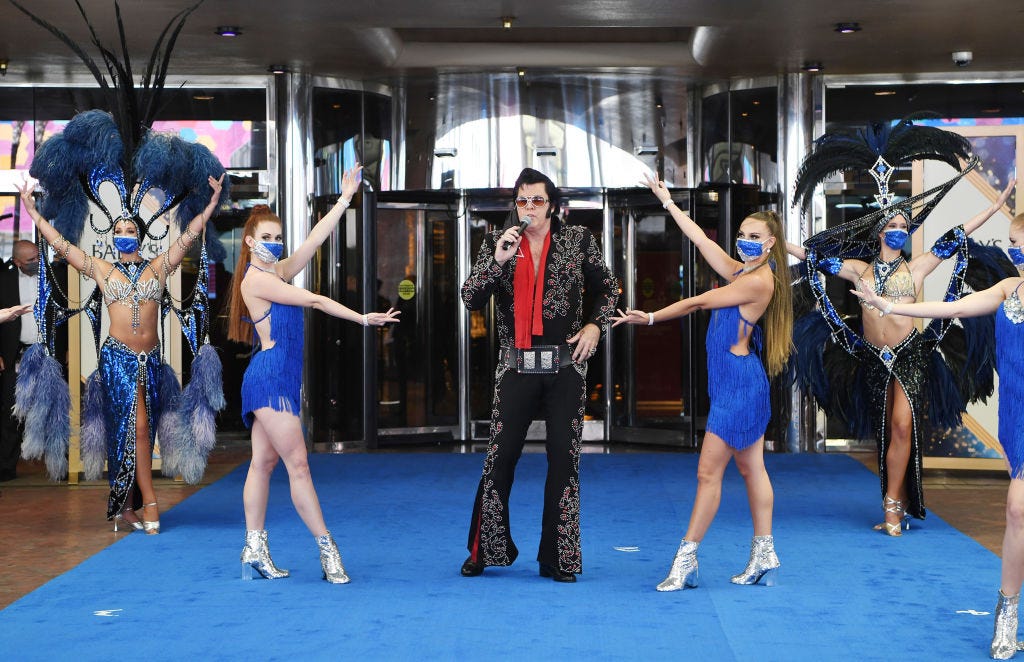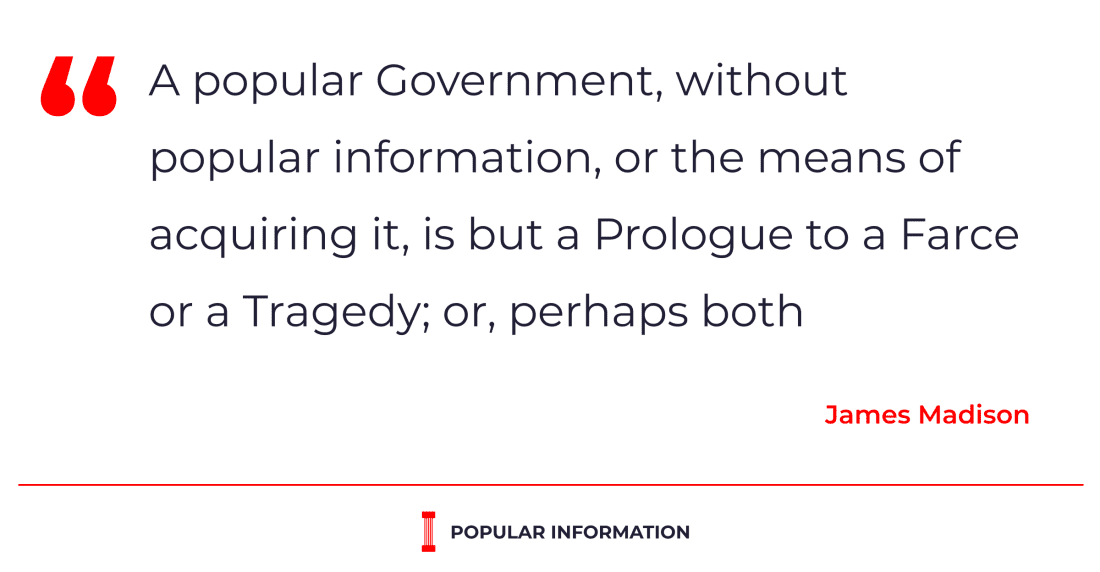Nevada rolls the dice

Las Vegas showgirls and Elvis impersonator pose for photos during the Bally's Las Vegas grand reopening celebration on July 23, 2020. (Photo by Denise Truscello/WireImage)
165,000 Americans have died, tens of millions are out of work, schools are not able to safely reopen, and testing capacity is woefully inadequate. But in the midst of the pandemic, corporate lobbyists have a clear priority: near-total immunity for COVID-related lawsuits.
It's already very difficult to successfully sue a corporation for exposing you to the coronavirus. That's probably why so few cases have been filed. According to a tracker maintained by the law firm Hunton Andrews Kurth, just a few dozen cases have been filed by employees alleging their employer exposed them to COVID-19 at work.
Still, as Georgetown University law professor David Vladeck explained in Congressional testimony, the threat of potential litigation plays an important role in keeping people safe:
With liability rules in place, employers and business have real-world incentives to take the precautions reasonably necessary to protect workers and consumers from infection—the risk that failure to do so may lead to lawsuits, regulatory enforcement, or both. Keeping liability rules in force is essential to build the confidence that workers and consumers need to go back to work and to reopen our economy.
Senate Majority Leader Mitch McConnell (R-KY), however, introduced legislation that would protect corporations from lawsuits in almost every conceivable case. Under McConnell's proposal, it's not enough for a business to act recklessly and put someone's safety in danger. Instead, plaintiffs would have to prove the business engaged in the conduct on purpose, knowing it would put people in danger.
That legislation faces an uncertain future because talks between Congressional Democrats, McConnell, and the White House have fallen apart. McConnell's insistence on the liability shield contributed to the breakdown.
As always, corporate lobbyists have a backup plan. Through a group called the American Legislative Exchange Council (ALEC), they are seeking liability protection from COVID-related lawsuits state-by-state.
In a recording obtained by the Intercept, the chair of an ALEC task force working on the issue, liability defense attorney Mark Behrens, said it was "really critical for state legislators to do what you can to solve the problem within the borders of your own state" because "we don’t know what’s going to happen at the federal level."
In recent days, ALEC has had success in Nevada, quickly pushing a liability shield through the state legislature and to the desk of Governor Steve Sisolak (D). Nevada is a state where such a shield could do the most harm. Casinos are potential breeding grounds for the virus, and cases in the state have "increased more than sixfold since casinos began reopening." If Sisolak signs the bill, the situation could get worse.
During a pandemic, what happens in Vegas does not stay in Vegas.
ALEC hits the jackpot
Last week, Nevada legislators approved a bill granting corporations sweeping COVID-19 liability protections. The bill provides businesses, government entities, and nonprofits immunity from liability “for personal injury or death resulting from exposure to COVID-19” so long as they are “in substantial compliance with controlling health standards.”
The bill has a broad definition of "controlling health standards,'' which includes federal, state, and local laws, regulations, and orders pertaining to COVID-19. According to the National Employment Law Project (NELP), this definition would allow businesses to select whatever standard they want to demonstrate compliance. This could include federal standards from the CDC and OSHA, which the Trump administration has made voluntary. A business can comply with these federal standards by doing nothing at all.
To win, a worker must prove not only that a business violated the prevailing health standards but that it did so with "gross negligence." Gross negligence requires not only recklessness conduct, but a conscious act the business knew would cause harm. This standard would make it virtually impossible for workers to hold their employers accountable.
The education exemption
Currently, Nevada’s bill exempts K-12 schools and universities. But this wasn’t always the case. When first introduced, the bill included K-12 schools and universities in the group of entities shielded from liability. This drew harsh criticism from teachers and experts, who pointed out that insulating schools from liability would ultimately discourage them from following best practices. Students, teachers, and other school employees would be forced to bear the brunt of the virus.
Clark County Education Association (CCEA) President Marie Neisess also said that “the need for this bill proves it is not safe to return. Unless the Governor and Legislators address the key issues of safety and employee protection, we cannot support employees working at a school site where it is possible to contract COVID-19.”
“If there is immunity, there is no incentive to ensure these classrooms, buildings, campus, and buses are safe,” CCEA Executive Director John Vellardita added. “We believe removing immunity from schools forces districts to adopt a safety and testing program.”
Vellardita raises a critical point. Immunity reduces the incentives for schools to protect children, teachers, and others. But the argument applies to any business. By eliminating virtually any possibility of liability, these businesses will be less safe for the public.
The odds favor COVID in Nevada's casinos
With COVID-19 upending tourism, a pillar of Nevada’s economy, the state was eager to reopen its casinos. On June 4, Governor Sisolak reopened the Las Vegas Strip and other gambling establishments across the state, saying, “We’re encouraging visitors to come and enjoy themselves and have a good time.” At the time, the state’s total number of confirmed cases hovered around 8,800. But as visitors began to trickle in, they brought the virus with them.
Between June 1 and July 25, more than 340 out-of-state visitors tested positive for the virus while visiting Nevada or shortly after returning home. According to the Las Vegas Review-Journal, visitors came from 32 states, Mexico, and Brazil. More than a third of the cases came from California, another emerging COVID hotspot. By late June, Sisolak reimposed bar closures. Today, the total case count in Nevada is at 56,728.
ALEC's grand ambitions
ALEC's push for a corporate liability shield during a pandemic has yielded results across the country. So far, 11 states have passed COVID-19 immunity laws: Alabama, Arkansas, Georgia, Iowa, Kansas, Louisiana, Mississippi, North Carolina, Oklahoma, Utah, and Wyoming.
In Tennessee, Governor Bill Lee called the General Assembly into a special session last week to “address liability protections.”
“The last thing small business owners, pastors, doctors and school superintendents need to worry about are frivolous lawsuits, which would further impede their ability to do their jobs in this difficult time,” said Tennesse Lt. Governor Randy McNally.
Yet, only two COVID-19 personal injury lawsuits have been filed in Tennessee according to the complaint tracker – a figure that pales in comparison to the 119,788 total confirmed cases in the state.
This week, Oregon lawmakers are convening for a second special session where they plan to consider proposals for liability protections. Meanwhile, legislators in Ohio, Idaho, and Arizona have been working on similar legislation.
If you value this work, please help spread the word! The bigger we grow the Popular Information community, the bigger our impact.
Click HERE for your unique referral link. As your friends and family sign up, you'll earn Popular Information merch and invitations to special events.
You can learn more about the impact this newsletter has had this year here.



All of the states that have thus far passed COVID-19 immunity statutes are red states. Seems like it's in keeping with their mentality, too: "We're going to force you back to work, but we're also going to make sure that you have no legal recourse if you get hurt/sick once you go back. Oh, and we're also going to cut unemployment benefits, too."
I'd like to think your readers are pretty savvy and are aware of who and what ALEC represents, but if not, I'd encourage them to become familiar with an organization that has made catering legislatively to corporate and other moneyed interests (and thus combating the influence of money in politics) a full-time business.